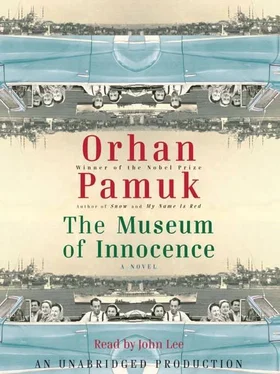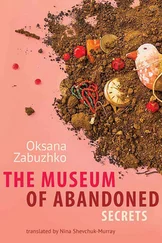“I’m very sorry,” I said, as we both kept our eyes on the television. “I meant no harm. It was because I was drunk that I left your earring next to the toothbrushes that evening, though I meant to hand it back to you properly.”
“There wasn’t any earring near the toothbrushes,” she said with a frown.
As we looked at each other, struggling to make some sense of this, her father came in holding a bowl of semolina and fruit helva , which he said was just for me. After taking one spoonful, I praised the helva to the skies. For a moment we were silent, as if it were for the helva that I had come here in the middle of the night. That was when I realized, as drunk as I was, that the earring had been an excuse: I had come here to see Füsun. And now she was teasing me, telling me she had not found the earring. During that silent interlude I remarked to myself that the pain of not seeing Füsun had been far more soul-destroying than the shame I had suffered in order to see her. I also knew at that moment that I was prepared to endure more situations like this to be spared the pain of not seeing her, though I was more defenseless in the face of shame than in that of longing. Caught now between the fear of humiliation and the fear of suffering her absence, I had no idea what to do, so I stood up.
There, right across from me, I saw my old friend Lemon. I took one step toward its cage, coming eye to eye with the bird. Füsun and her parents had stood up with me, perhaps relieved to see me go. Again I was delivered to the dreadful awareness that had driven me from this wretched house the last time. Füsun was married now; I would not be able to lure her away. Remembering, too, what conclusion I had drawn following the last visit-that she was after my money-I resolved once more that this was the last time I’d ever see her. I was never going to set foot in this house again.
Then the doorbell rang. This oil painting captures that moment when Lemon and I were staring at each other, while Füsun and her parents were staring at me and the canary from behind, just before the doorbell rang and we all turned to look at the door: I commissioned it many years after these events. Because the point of view is that of Lemon the canary, with whom I had identified in some strange way at that moment, none of our faces are depicted. It portrays the love of my life, viewed from the back, just as I remembered, and every time I see it, this painting brings me to tears; and let me add with pride that the artist has caught the night peeking through the parted curtains, the dark neighborhood of Çukurcuma in the background, and the room’s interior with perfect fidelity to my descriptions.
Füsun’s father went over to the bay window to look down at the mirror that was mounted in such a way as to reflect the front and, announcing that it was one of the neighbors’ children ringing the bell, he went downstairs. There was a silence. I went to the door. As I put on my coat I lowered my head and stayed silent. As I opened the door, it occurred to me that all was not lost: This could be the “revenge” scene I had been preparing for a year now, but keeping this fact to myself, I simply said, “Good-bye.”
“Kemal Bey,” said Aunt Nesibe. “We cannot begin to tell you how glad we were that you rang our bell as you were passing by.” She glanced at Füsun. “Don’t pay any attention to her pouting. She’s afraid of her father. If she weren’t, she’d have shown herself as happy as we were to see you.”
“Oh, Mother, please,” said my beloved.
It did cross my mind to begin the parting ritual with some pronouncement along the lines of Well, I can’t bear her hair being black, but I knew these words would ring false: I was willing to suffer all the pain in the world for her, and what’s more I knew that willingness would be the death of me.
“No, no, she looks fine,” I said, looking meaningfully into Füsun’s eyes. “Seeing how happy you are has made me happy, too.”
“It was seeing you that made us happy, too,” said Aunt Nesibe. “Now that your feet know how to get here, we hope you’ll visit us often.”
“Aunt Nesibe, this is the last time I’ll be visiting you,” I said.
“Why? Don’t you like our new neighborhood?”
“It’s our turn now,” I said with fake jocularity. “I’m going to talk to my mother and ask her to invite you over.” There was, I’d like to say, a certain indifference in the way I walked down the stairs, not once looking back at them.
“Good-night, my son,” said Tarık Bey softly when I met him at the door. The neighbor’s child had given him a package, saying, “This is from my mother!”
As I felt the fresh air cool my face, I thought how I would never again see Füsun, and for a moment I believed I had an untroubled, carefree, happy life before me. I imagined that Billur, the Dağdelens’ daughter, whom my mother was going to visit, would be charming. But with every step I took, farther from Füsun, I felt as if I were leaving a piece of my heart behind. As I walked up Çukurcuma Hill, I could feel my soul quivering in my bones, straining to return to the place I’d just left, but I still believed it was only a matter of letting this fever break and then I’d be over it.
I’d come a long way. What I needed now was to find ways to distract myself, to remain strong. I went into one of the meyhanes that was about to shut, and sitting in the atmosphere of thick blue cigarette smoke I drank two glasses of raki with a slice of melon. When I went back out into the street, my soul was telling my body we had not gone far from Füsun’s house. At this point I must have lost my way. In a narrow street I came across a familiar shadow that sent an electric shock through me.
“Oh, hello!” he said. It was Füsun’s husband, Feridun.
“What a coincidence,” I said. “I’m just coming back from your house.”
“Is that so?”
Once again I was shocked to see how young this husband was-how childish, in fact.
“Ever since my last visit, I’ve been thinking about this film business,” I said. “You’re right. We have to make art films in Turkey, too, just as they do in Europe… But since you weren’t there, I didn’t have a chance to talk about all this. Shall we get together some evening?”
I could sense an immediate confusion in his evidently tipsy mind (by the whiff of him, he’d had at least as much to drink that evening as I had).
“Why don’t I come and pick you up on Tuesday evening at seven?” I said.
“Füsun can come too, right?”
“Of course, if we are to make a European-style art film, we must have Füsun play the lead!”
For a moment we smiled at each other like two old friends who, having shared the long, trying years of school and military service, had at last seen their ship come in. In the lamplight I looked probingly into Feridun Bey’s eyes, each of us imagining he’d gotten the better of the other, and we parted in silence.
51 Happiness Means Being Close to the One You Love, That’s All
I REMEMBER that when I reached Beyoğlu, its shop windows were glittering and I was glad to walk among the crowds streaming out of the cinemas. My happiness-the joy I could take in life-was impossible to deny. That Füsun and her husband had invited me to their house so that I would invest in their preposterous film dreams should perhaps have caused me only shame and humiliation, but so great was the happiness in my heart that I felt no embarrassment whatsoever. That night my mind was fixed on one fantasy: the film premiere, and Füsun holding the microphone, speaking to the admiring audience at the Palace Cinema-or was the New Angel Cinema a better choice?-thanking me first and foremost. When I came on stage, those attuned to the latest gossip would whisper that during the filming the young star had fallen in love with the producer and left her husband. The photograph of Füsun kissing me on the cheek would appear in all the newspapers.
Читать дальше












